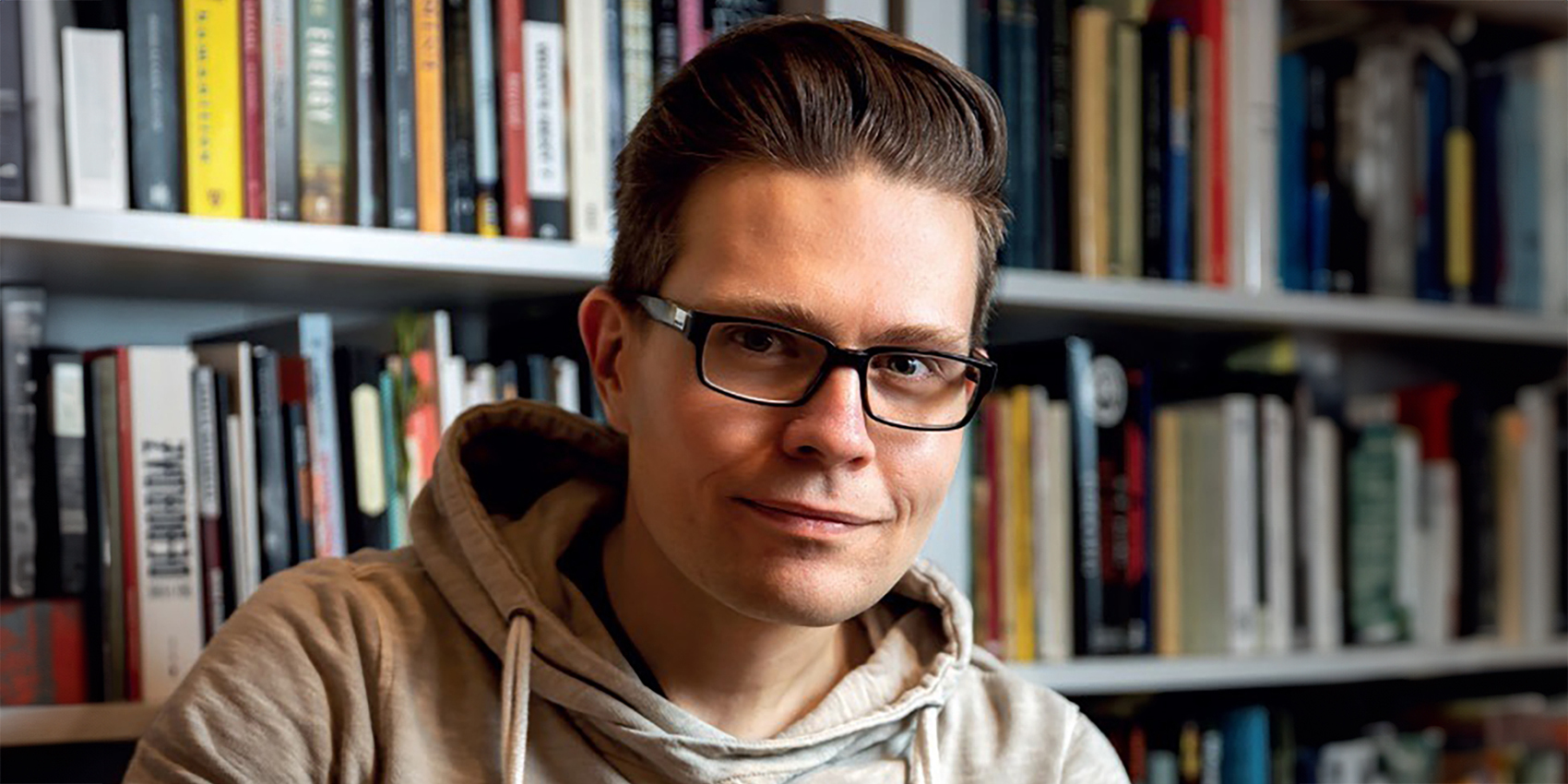
„Ludzie są od siebie różni, potrzebują różnych modeli szkoły, różnych form edukacji” – mówi dr Mikołaj Marcela
Ewa Podsiadły-Natorska: Polska szkolna rzeczywistość jest smutna?
Dr Mikołaj Marcela: Zależy gdzie. Są szkoły, w których rzeczywistość nie jest smutna, a wręcz przeciwnie – dzieci nie chcą z nich wychodzić. To np. historia szkoły demokratycznej w Tychach, o której piszę w książce. Jej założyciele musieli dojść do tego, w jaki sposób zachęcić dzieci, żeby chciały… wracać do domu. Ale to wciąż rzadkość, nadal słyszę historie o dzieciach, które mówią, że nienawidzą szkoły i nie chcą do niej chodzić. Nie mogą się w szkole odnaleźć. Moja poprzednia książka nosi tytuł „Nie jesteś skazanx na szkołę”, bo młodzi ludzie – jak sami mówią w czasie spotkań ze mną – często czują się w szkole, jakby to było więzienie, miejsce przymusowego pobytu, a nie takie, w którym powinny czuć się dobrze i rozwijać się zgodnie ze swoim potencjałem.
Gdzie leży problem? System edukacji został z gruntu źle zaprojektowany i przez kolejne pokolenia będziemy ponosić tego konsekwencje?
Po pierwsze tym, czego bardzo usilnie próbujemy nie dostrzec, jest to, że ludzie są od siebie różni, potrzebują różnych modeli szkoły, różnych form edukacji. W jednej formie się odnajdą, w innej nie.
Natomiast my zakładamy, że szkoła jest, jaka jest; przyzwyczailiśmy się, że mamy tradycyjny model z podziałem na przedmioty, 45-minutowe lekcje, na których wszyscy mają uczyć się w tym samym tempie itd. W przypadku niektórych dzieci to się sprawdza, ale są to dzieci dobrze do takiej szkoły przygotowane, które posiadają odpowiedni kapitał ekonomiczny i kulturowy wyniesiony z domu rodzinnego, co pozwala im być przygotowanym na to, co szkoła daje, ale i spełniać jej wymagania. Te dzieci bardzo często nie tyle się uczą, co korzystają z umiejętności czy wiedzy, które już mają, bo nauczyły się tego z rodzicami lub na dodatkowych zajęciach (na przykład z języka obcego) przed pójściem do szkoły. Dzięki temu zyskują łatkę osób zdolnych, wybitnych. Takich, które nie sprawiają problemów.
Co z resztą uczniów?
Właśnie. Mamy bardzo dużą grupę dzieci, które wywodzą się z rodzin biedniejszych, z rozmaitymi problemami, które wchodząc do szkoły, nierzadko słyszą, że są problematyczne. Nie potrafią wysiedzieć w miejscu, nic ich nie interesuje, nie uczą się tak szybko jak inni. Te dzieci nie dość, że nie otrzymują tego, co powinny dostać od szkoły, to jeszcze bardzo często dostają „po głowie” za to, że nie są tak dobre jak inne dzieciaki. Od takiej opowieści zaczynam swoją książkę – to historia, która zmieniła życie Marzeny Żylińskiej (dr, metodyczka, założycielka fundacji Budząca Się Szkoła, której celem jest inicjowanie oddolnych zmian systemu edukacji – przyp. red.). Jest to historia chłopca z rodziny z problemami. Chłopiec sprawiał kłopoty swojej nauczycielce i dopiero kiedy Marzena Żylińska z nim porozmawiała, uświadomiła sobie, jak wiele jest takich dzieci, którym szkoła nie pomaga, a wręcz buduje w nich przekonanie, że do niczego się nie nadają. I chyba w tym tkwi problem.
Ważne, żeby zrozumieć, że nie jesteśmy skazani na szkołę w takim modelu, w jakim ona funkcjonuje. I że niektóre dzieci bardzo potrzebują właśnie innych modeli szkoły.
Jakie inne formy edukacji niż „standardowe” funkcjonują w Polsce?
Mamy szkoły Montessori, waldorfskie, demokratyczne, freinetowskie – tej ostatniej dyrektorką jest Marzena Kędra w Poznaniu i jest to szkoła publiczna, o czym warto wspomnieć. Mamy szkoły autorskie, które czerpią z edukacji fińskiej. Mamy rozmaite projekty autorskie w szkołach publicznych. Przykładem jest szkoła w Radowie Małym, gdzie kładzie się bardzo duży nacisk na praktykę i autonomię uczniów. Mamy też różne modele edukacji domowej, Szkołę w Chmurze itd. To wszystko powinno być częścią systemu publicznego – aby każdy w określonym modelu mógł się jak najlepiej rozwijać. W dużej mierze rozwiązałoby to problem polskiego systemem edukacji, zmieniłoby jego postrzeganie i sprawiłoby, że dzieciaki rzeczywiście zaczęłyby się uczyć. Niestety na ten moment wiele z wymienionych przeze mnie alternatywnych form edukacji jest dodatkowo płatna.
Czym są szkoły demokratyczne – jak szkoła w Tychach, od której zaczęliśmy rozmowę?
Szkoły demokratyczne działają na razie w ramach tzw. spełniania obowiązku szkolnego poza szkołą, który popularnie nazywamy edukacją domową.
Wbrew naszym wyobrażeniom dziecko w edukacji domowej nie musi uczyć się tylko w domu – może być zapisane do jakiejś placówki, która działa w ramach edukacji domowej. W takich szkołach najczęściej nie ma planu lekcji, a dzieci nie mają obowiązku chodzenia na zajęcia.
Przez określony czas znajdują się pod opieką dorosłych opiekunów i zarządzają swoim czasem. Jeśli chcą pójść na zaproponowane zajęcia, to mogą, ale jeśli wolą przeczytać książkę, pograć w piłkę czy spędzić czas w kuchni, to też mają taką możliwość.
Ale muszą zaliczyć egzaminy klasyfikacyjne pod koniec roku.
Oczywiście. W szkołach demokratycznych, co istotne, kładzie się bardzo duży nacisk na budowanie społeczności, np. każde dziecko ma jeden głos w radzie szkoły i może wpłynąć na to, jak działa dana jednostka. Pomyślelibyśmy, że to coś nowego, ale pierwsza taka placówka – Summerhill – została założona w 1921 roku, więc ponad 100 lat temu. Natomiast pierwsza szkoła stricte demokratyczna powstała w Haderze w 1987 roku i działa do dzisiaj. Uczy się w niej ok. 700 uczniów i uczennic. Tego typu przykłady pokazują, że takie szkoły spokojnie mogą funkcjonować i że bardzo dużo osób świetnie się w nich rozwija. W Polsce jedną z pierwszych takich szkół była Wolna Szkoła Demokratyczna Bullerbyn, o której piszę w „Zróbmy sobie szkołę”.
Jak dużo pana zdaniem zależy wychowawcy?
Myślę, że najwięcej zależy od dyrektora. W książce moimi rozmówcami są przede wszystkim dyrektorki i dyrektorzy, którzy przejęli szkoły publiczne i je przeobrazili lub którzy tworzyli szkoły publiczne i niepubliczne od zera.
Bo to, jak szkoła funkcjonuje, jest kwestią tego, jaką wizję ma dyrektor, w jaki sposób układa relacje z nauczycielami i rodzicami, na ile jest osobą, która potrafi rozwiązywać problemy, czy oferuje nowe rozwiązania np. spotkania z rodzicami i dziećmi zamiast typowych wywiadówek. Wychowawca natomiast jest jednym z nauczycieli i on oczywiście może dużo. Jest bardzo wielu nauczycieli, którzy nie czekając na decyzje dyrektorów, rezygnują z ocen, sprawdzianów lub kartkówek, zastępując je nowymi rozwiązaniami.

Prawo na to pozwala?
Tak! Jaki jest efekt rezygnacji z ocen? Uczeń przestaje się martwić, czy dostanie piątkę, czy jedynkę i czy będzie się musiał tłumaczyć rodzicom.
Badania, ale i doświadczenia nauczycieli/nauczycielek w Polsce pokazują, że gdy nie ma ocen, to dzieci chcą robić rzeczy trudne, bo chcą się sprawdzić, zobaczyć, czy im się uda. A jak się nie uda, to nic się nie stanie.
Natomiast jak dostanę piątkę, to wiadomo, że moi rodzice będą zadowoleni, nauczycielka będzie zadowolona, ale czy ja się czegoś faktycznie nauczę, to już inna sprawa.
Co pan sądzi rezygnacji z prac domowych w klasach 1–3?
Nie ma podstaw do tego, żeby dzieciom w klasach 1–3 zadawać prace domowe. Świetnie, że poszliśmy w tę stronę, chociaż dla mnie żaden zakaz nie jest rozwiązaniem – rozwiązaniem jest na tyle głęboka zmiana świadomości społecznej, żeby ludzie sami zrozumieli, że prace domowe nie mają sensu.
Zabierają czas, mogą zrazić do jakiegoś tematu albo po prostu zmęczyć. W jednej z poprzednich książek pisałem, że w bardzo wielu przypadkach w szkole podstawowej, kiedy uczeń czy uczennica mają nauczyć się jakiegoś zagadnienia z matematyki lub fizyki, istnieje pewne prawdopodobieństwo, że w ich mózgu nie wykształciły się jeszcze konkretne obszary pozwalające na zrozumienie tych zagadnień. Możemy sądzić, że oni nie chcą się czegoś nauczyć, że kieruje nimi zła wola, podczas gdy oni nie potrafią czegoś zrobić.
Świetnym przykładem z ostatniego roku jest historia Jasona Ardaya, najmłodszego czarnoskórego profesora w Cambridge, który do 11. roku życia nie potrafił mówić, a do 18. roku życia pisać. Zdiagnozowano u niego opóźnienie w rozwoju, był osobą w spektrum (autyzmu – przyp. red.). Wszystkiego nauczył się dzięki determinacji swoich rodziców i nauczyciela. W wieku 37 lat został najmłodszym czarnoskórym profesorem w Cambridge. Mierząc go standardową szkolną miarą, właściwie nie powinien w ogóle pójść na uniwersytet. Jego przypadek znajduje się poza naszym wyobrażeniem o tym, jak przebiega „właściwy” rozwój (zgodnie z rytmem wyznaczanym przez szkołę) i czego wymaga szkoła na poszczególnych etapach. Problem leży w tym, że wiele osób po prostu nie jest przygotowane na przerobienie danego materiału, na zrozumienie go, więc wymuszanie obowiązkowych prac domowych i zakładanie, że jeśli będzie się więcej pracować, to się zrozumie, jest założeniem błędnym. Moim zdaniem prace domowe powinny być fakultatywne. To szkoła jest przestrzenią do nauki, zwłaszcza że młodzi mają coraz więcej zajęć dodatkowych, sportowych. Jak mówi ks. Michał Kiersnowski (były dyrektor Collegium Leonium w Sierpcu, publicznego liceum ogólnokształcącego, w którym zrezygnowano z klasycznych stopni), jeśli zakładamy, że szkoła ma być całym życiem młodego człowieka, to popełniamy straszny błąd.
Szkoła to tylko część życia i to wcale nie ta najważniejsza.
A co w systemie edukacji mogą zrobić rodzice?
Wszystkie moje książki są skierowane przede wszystkim do rodziców, bo uważam, że rodzice mogą zrobić najwięcej; to od nich zaczyna się zmiana świadomości dotyczącej tego, co się w szkole liczy. Że ocena nie świadczy o człowieku.
Tymczasem wciąż mamy przekonanie, że jeśli dziecko będzie miało najwyższą średnią, to stoi przed nim świetlana przyszłość. To błędne założenie. A efektem walki o jak najlepsze stopnie bardzo często jest wypalenie uczniowskie. Presja jest tak duża, że może pojawić się depresja albo inne choroby.
Czasem od przerobienia jakiegoś materiału ważniejsze jest to, żeby dziecko wyszło z domu, poszło na imprezę, przeznaczyło czas na tzw. głupoty. Część nauczycieli jest gotowa na zrezygnowanie z ocen i sprawdzianów, ale mierzą się z murem ze strony rodziców. W jednej z niedużych szkół wiejskich niemalże doszło do linczu na nauczycielce, która zrezygnowała z ocen. Grupka rodziców, krzycząc na nią, domagała się ich przywrócenia. Nie wyobrażali sobie, że można uczyć się bez ocen. I pamiętajmy, że również rodzie mogą zakładać szkoły – o tym też jest moja książka. Dziecko nie jest skazane na jedną placówkę – zawsze można ją zmienić albo skorzystać z edukacji domowej, stworzyć kooperatywę rodzicielską. Jest wiele możliwości.
„Zróbmy sobie szkołę. O tych, którzy rozkręcają edukację po swojemu”, Mikołaj Marcela, wyd. W.A.B. 2024.
Dr Mikołaj Marcela – nauczyciel akademicki, autor bestsellerowych poradników i książek o edukacji („Jak nie spieprzyć życia swojemu dziecku”, „Dlaczego szkoła cię wkurza”, „Selekcje. Jak szkoła niszczy ludzi społeczeństwa i świat”). Wicedyrektor dwóch kierunków studiów na Uniwersytecie Śląskim w Katowicach (sztuka pisania oraz twórcze pisanie i marketing wydawniczy). Ostatnio wydał reportaż o alternatywnych formach edukacji w Polsce: „Zróbmy sobie szkołę”.






































